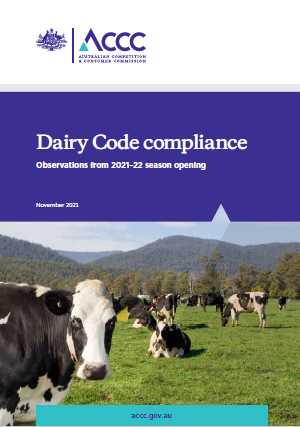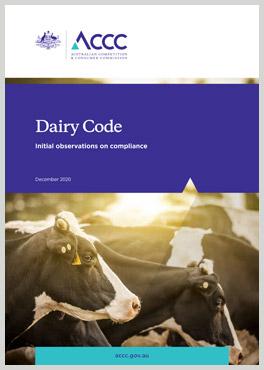On this page
Breaches of the Dairy Code
Breaches of the Dairy Code can have serious consequences, including penalties and other enforcement action.
Farmers and processors may breach the civil penalty provisions under the code if they:
- fail to deal with each other in good faith
- vary a milk supply agreement so that it does not comply with the code
- unilaterally vary or terminate a milk supply agreement in manner that is not permitted by the agreement
- fail to keep adequate records.
A processor may also breach the civil penalty provisions if they:
- purchase milk from a farmer without a milk supply agreement in place
- enter into a milk supply agreement that does not comply with the code
- fail to create a written record of any unwritten milk supply agreement
- fail to adhere to any of the publishing obligations
- withhold any loyalty payments from farmers
- step-down the price for milk in a manner that is not permitted by the code.
Enforcement of the code
The ACCC is responsible for enforcing the code.
If we think someone has breached the code we can investigate and may take enforcement action.
The ACCC has a range of options to ensure compliance with the code. We consider several factors when deciding which options to use. For more information, see our Compliance and Enforcement Policy.
Enforcement options include:
- administrative resolutions, such as the party in breach agreeing to stop the behaviour
- court enforceable undertakings under section 87B of the Competition and Consumer Act 2010
- infringement notices
- court action.
If you have suffered loss or damage because of a breach of the code, you may take court action seeking other remedies, such as damages.
Compliance checks
We conduct regular compliance checks to make sure processors are complying with the code.
We can require farmers and processors to provide us with certain information and documents. This helps us understand if:
- the code is being complied with
- records are being kept correctly
- there are compliance issues across the industry that we need to focus on.
See Industry code compliance checks for information about the actions we take.
Compliance reports





